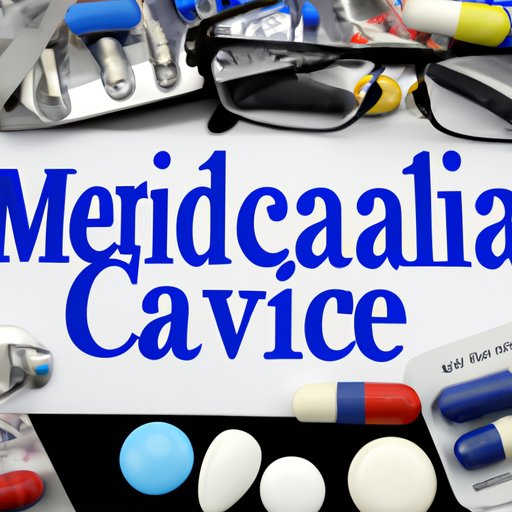
Overview of What Medicare Covers
Medicare is a federal health insurance program that provides health care coverage to people who are 65 years or older and those with certain disabilities. Medicare is an important part of the U.S. health care system, providing access to medical services for millions of Americans. It is important to understand exactly what Medicare covers, so you can make informed decisions about your health care needs.
What Does Medicare Cover?
Medicare is made up of four parts: Part A (Hospital Insurance), Part B (Medical Insurance), Part C (Medicare Advantage plans) and Part D (Prescription Drug Coverage). Each of these parts provides different types of coverage and benefits.
Part A (Hospital Insurance)
Part A covers inpatient hospital stays, skilled nursing facility care, hospice care and home health care. It also covers some preventive services such as flu shots and certain screenings.
Part B (Medical Insurance)
Part B covers doctor visits, outpatient care, medical supplies and some preventative services. It also covers some mental health services and durable medical equipment.
Part C (Medicare Advantage plans)
Part C plans are offered by private insurance companies and provide additional coverage beyond what is available through original Medicare. These plans typically include prescription drug coverage, vision care and dental care, as well as other benefits.
Part D (Prescription Drug Coverage)
Part D is a voluntary program that provides coverage for prescription drugs. This coverage is offered through private insurance companies that have been approved by Medicare.
When Does Medicare Cover Prescription Drugs?
To be eligible for coverage under Part D, you must be enrolled in Medicare Part A and/or Part B and you must reside in the United States. You must also be enrolled in a plan that offers Part D coverage. Most Part D plans have an annual deductible, as well as copayment or coinsurance amounts for each prescription drug.
Medicare Part D covers most types of prescription drugs, including generic drugs and brand name drugs. However, there are some drugs that are not covered by Part D, such as over-the-counter medications and drugs used for cosmetic purposes.
Understanding Medicare Coverage for Vision and Dental Care
Original Medicare does not cover routine vision care or dental care. However, some Medicare Advantage plans may include coverage for vision and dental care. It is important to check with your plan to see if these services are covered.
Vision Care Coverage
If your Medicare Advantage plan includes vision care coverage, it may cover routine eye exams, glasses, contact lenses and other vision care services. Some plans may also cover laser eye surgery.
Dental Care Coverage
If your Medicare Advantage plan includes dental care coverage, it may cover routine dental visits, cleanings, fillings, X-rays and other dental care services. Some plans may also cover dentures and other dental procedures.

Considering Supplemental Insurance to Fill Gaps in Medicare Coverage
Supplemental insurance can help fill gaps in Medicare coverage. Supplemental insurance is a type of private insurance that helps pay for costs not covered by Medicare, such as deductibles, coinsurance and copayments. It can also help cover costs for services not covered by Medicare, such as dental care and vision care.
What is Supplemental Insurance?
Supplemental insurance is a type of private insurance that helps pay for costs not covered by Medicare. It is typically offered by private insurance companies and can help cover costs such as deductibles, coinsurance and copayments. It can also help cover costs for services not covered by Medicare, such as dental care and vision care.
Types of Supplemental Insurance
There are several types of supplemental insurance available, including Medigap policies, Medicare Advantage plans, employer-sponsored plans and long-term care insurance. It is important to research the different types of plans available and compare them to find the best option for you.

How to File a Claim for Medicare Coverage
If you need to file a claim for Medicare coverage, the process is relatively simple. Here are the steps to follow:
- Gather the necessary documents, such as your Medicare card, medical bills and any other paperwork related to your claim.
- Contact your doctor or hospital to obtain a copy of your medical records.
- Fill out the appropriate forms from your Medicare plan and submit them along with your supporting documents.
- Wait for a response from your Medicare plan.
- If you have questions or need assistance, contact the Medicare plan directly.
It is important to keep track of all your medical bills and paperwork, as this will help speed up the claims process.
Finding Resources to Learn More About Medicare Coverage
If you want to learn more about Medicare coverage, there are many online and local resources available. Here are some of the best resources to explore:
Online Resources
The official website for Medicare (www.medicare.gov) is a great place to start. The site provides detailed information about each part of Medicare, as well as helpful tools and resources. Additionally, the Centers for Medicare & Medicaid Services (CMS) website (www.cms.gov) provides updates and news about changes to Medicare.
Local Resources
Your local Area Agency on Aging office can provide information about Medicare coverage and other resources for seniors. Additionally, your state Department of Insurance website may provide helpful information about supplemental insurance plans.
Understanding Medicare coverage is essential for making informed decisions about your health care needs. Knowing what is covered and how to file a claim can help you get the care you need. By exploring the different parts of Medicare and considering supplemental insurance, you can ensure that you have the coverage you need.
(Note: Is this article not meeting your expectations? Do you have knowledge or insights to share? Unlock new opportunities and expand your reach by joining our authors team. Click Registration to join us and share your expertise with our readers.)
